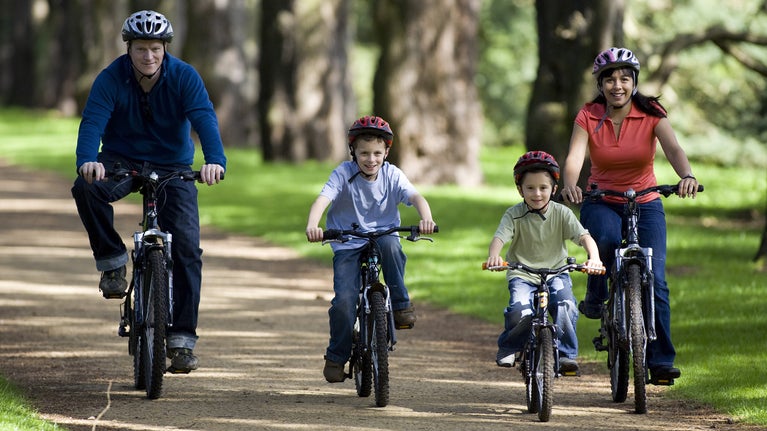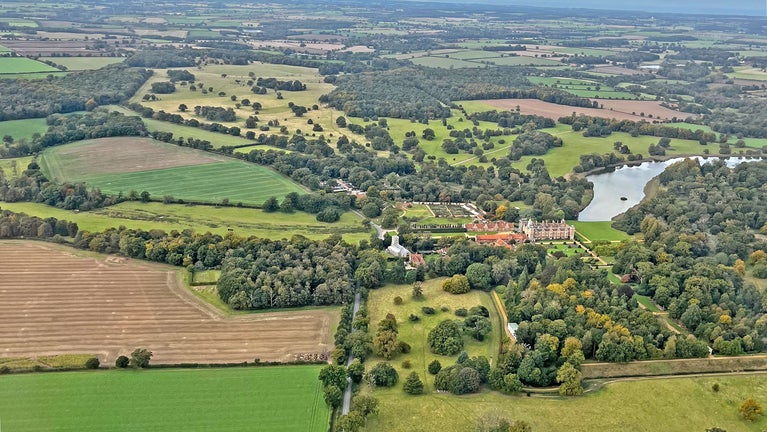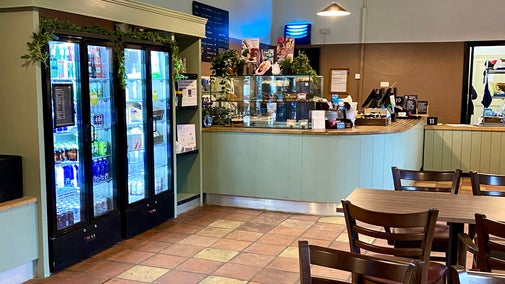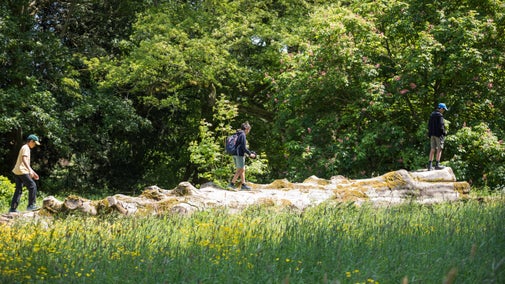
Cycling at Blickling Estate
With bikes for all ages, including electric, trailers and balance bikes, the whole family can explore Blickling's parkland on two wheels.

Blickling Estate covers around 4,600 acres of varied landscape that's ideal for exploring by yourself, or with your family or dog.
Blickling was the first complete working estate to be gifted to the National Trust in 1940. The rotation of crops and the movement of livestock around the park still shape the natural calendar of Blickling today.
Having been returned from arable land, the formal park and the livestock on it constitute an important grazing scheme, the aim of which is to improve grassland biodiversity through low density grazing. The sheep and cattle eat, trample and roll on the grass, allowing less competitive plant species to become established as dominant species are reduced.
The sheep arrive back onto the park in early April after having their lambs nearer to the shepherd’s home (so he can keep a close eye on them). The sheep are kept in lower Tower Park, to the west of the red walking route, from April to October and are surrounded by electric fencing.
The lambs are taken off the park in October, and rams are introduced for mating season. The sheep are, for this part of the year, given free reign over both lower Tower Park and the grassland between there and the lake. They need more room to do some frolicking of a different kind!
You may have seen cattle with their calves grazing on the river meadows to the north of the estate on a recent walk. In late March we also welcome the cattle back to the park. The cows live in upper Tower and Hyde Park, and in fields dotted around the east side of the Lake walk.
The Countryside Code is a good companion to any walk in the great outdoors, but here’s a guide to what that means for you and your dog on the Blickling Estate.
We ask that you keep your dog on a lead when in the car park and while walking around the lake. Dogs are welcome in the parkland, woodland and on rights of way across the wider estate, please keep you dog under close control at all times and always respect other park users.
Dogs are welcome in the Farmyard area, where you'll find Blickling's second-hand bookshop. They're also welcome in the back room of Muddy Boots café and in The Bucks Arms pub.
Read more about bringing your dog to Blickling.

The Mausoleum is one of Blickling’s most iconic landmarks. At over two centuries old, the pyramid structure stands boldly on the edge of ancient woodland, creating a unique and dramatic view across the sweeping landscape.
The pyramid is made of 190,000 Portland stone blocks, formed on the estate by builder Henry Wood. The pyramid originally gleamed white and despite over two centuries of weathering, can still be clearly seen from the south end of the lake.
Ancient trees and woodland at Blickling form part of a nationwide network of 70 Ancient Woodlands and Trees dedicated to The Queen in celebration of her Platinum Jubilee.
The initiative was launched by His Royal Highness The Prince of Wales, who is Patron of The Queen’s Green Canopy, under one of the Ancient Tree dedications - the old Sycamore located at Dumfries House in Scotland.
Blickling is home to about 1,000 veteran trees within an area of 500 acres (200 hectares). Among the trees in the park are ancient small-leaved limes; once the dominant tree species in this part of the world, some of which can be seen in the Great Wood.
- Stuart Banks, Trees and Woodland Adviser

The lake was formed in 1729 by damming the stream which runs into the River Bure from Pond Meadow. Teeming with wildlife and measuring 2km at its widest point, Blickling’s lake supports a diverse ecosystem including carp, pike, reed warblers and great crested grebes. The small circular island was probably made in the 1860s as a roost for water fowl.
Since 2016, the lake has become more important than ever, as its used to harness green energy thanks to the National Trust's Renewable Energy Investment Programme.
A state-of-the-art water-source heat pump, which sees three miles of pipes connected in a giant loop system under the surface of Blickling's lake, extracts enough heat to warm the house and one of the service wings. The benefits of this fantastic project are huge. Since its introduction, we save an average of 69 tonnes of carbon emissions per year, decreasing our oil consumption by over 25,000 litres. The house and offices are heated more consistently with ambient heat, making it a more reliable and steady heat source for the precious collection.
In the autumn of 2023, an important conservation project was carried out on the north end of the lake wall.
The sluice-gate was replaced, helping to control the water level of the lake and preventing unexpected flooding in the surrounding land. At the same time, essential repairs were carried out to the dam wall.
The Blickling Parish Church is an architectural delight set within Blickling Estate, and right next to Blickling Hall itself. It's open daily for you to explore, and has a varied programme of events throughout the year.

With bikes for all ages, including electric, trailers and balance bikes, the whole family can explore Blickling's parkland on two wheels.
Tour the Blickling Estate by bike, wheelchair, with a pushchair or on foot, via this all-weather hard-surface footpath, with historic buildings and woodland along the way.

Explore the Blickling Estate's parkland on this family-friendly walk, visiting points of interest including the Tower, Brickyard and Mausoleum.

This historical scenic stroll through woods and open land at Blickling Park leads you to its striking Mausoleum. Look out for barn owls along the way.

Take a walk around Blickling Estate to see where men and women who served at nearby RAF Oulton during the Second World War were accommodated.

Tackle this long circular walk around Blickling, taking in the villages of Calthorpe and Erpingham, the estate’s Great Wood and several historic buildings.

Blickling is a three pawprint rated place. The parkland is the perfect place to take your dog for a walk. Read our guide on how to make the most of your visit together.

Offering delicious, locally sourced and produced food, stop at one of the cafés, browse in the shop or grab a bargain in the second-hand bookshop.

Plan a visit to one of the special countryside places in our care and discover the benefits of being in the great outdoors. Pack your walking boots and get ready to explore woodlands, valleys and rivers.
